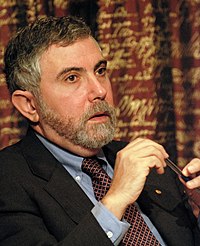
PAUL KRUGMAN’S EXPLANATION OF KEYNESIAN ECONOMICS
Let‘s start out by saying that Paul Krugman probably doesn’t really think the government should lie to the country about alien invaders attacking the world just to boost the economy and create jobs. Still, that’s the analogy he used while appearing with Fareed Zakaria on CNN and trying to explain the brilliance of Keynesian economics.
“If we discovered that, you know, space aliens were planning to attack and we needed a massive buildup to counter the space alien threat and really inflation and budget deficits took secondary place to that, this slump would be over in 18 months,” he said. “And then if we discovered, oops, we made a mistake, there aren’t any aliens, we’d be better–.”
He added: “No. There was a ‘Twilight Zone’ episode like this, in which scientists fake an alien threat in order to achieve world peace. Well, this time we don’t need it [to achieve world peace]; we need it in order to get some fiscal stimulus.”
By the way, it should be noted that Krugman’s comments came in response to Zakaria defending the Keynesian idea that the government could dig ditches and employ people to fill them in order to stimulate the economy:
http://www.youtube.com/watch?v=E1Fzzs7oVaA&feature=player_embeddedEagle-eyed blogger Zombie notes that the alien plot actually originates form an “Outer Limits” episode, not “The Twilight Zone.” And Hot Air’s Ed Morrissey picks apart the Keynesian/Krugman/Zakaria economic theory:
Krugman, who won a Nobel Prize in economics, somehow forgets to tell Zakaria that seizing capital from productive enterprises in taxes (or worse, borrowing against future legitimate production in deficit spending) to fund the “ditch cycle” has opportunity costs — namely, the opportunity to produce something other than pre-filled ditches, which have a real value of zero. That’s actually a significant part of what’s wrong now. Government spending doesn’t create economic growth; it takes money from actual production, and so should be used sparingly and only for necessities.
Krugman then takes Zakaria’s reductio ad absurdum and makes it more absurd by postulating that a mistaken alarm of a space invasion would create vast economic growth, which would just remain even after the Emily Litella moment when the space aliens didn’t invade. Unfortunately, the Nobel Prize-winning economist doesn’t explain what would happen when all of the assets built to meet the threat turn out to be useless and can’t be converted into productive assets for a non-space-war economy. Thanks to the massive seizure of capital it would take to create the defensive and offensive assets to meet that threat, we’d be left with little to power our economy, especially in a highly regulatory (and rationed) total-war economy.
I guess you could call it “far out.”
Read more: http://www.theblaze.com/stories/krugman-tries-to-explain-keynesian-economics-with-alien-invasion-analogy/

